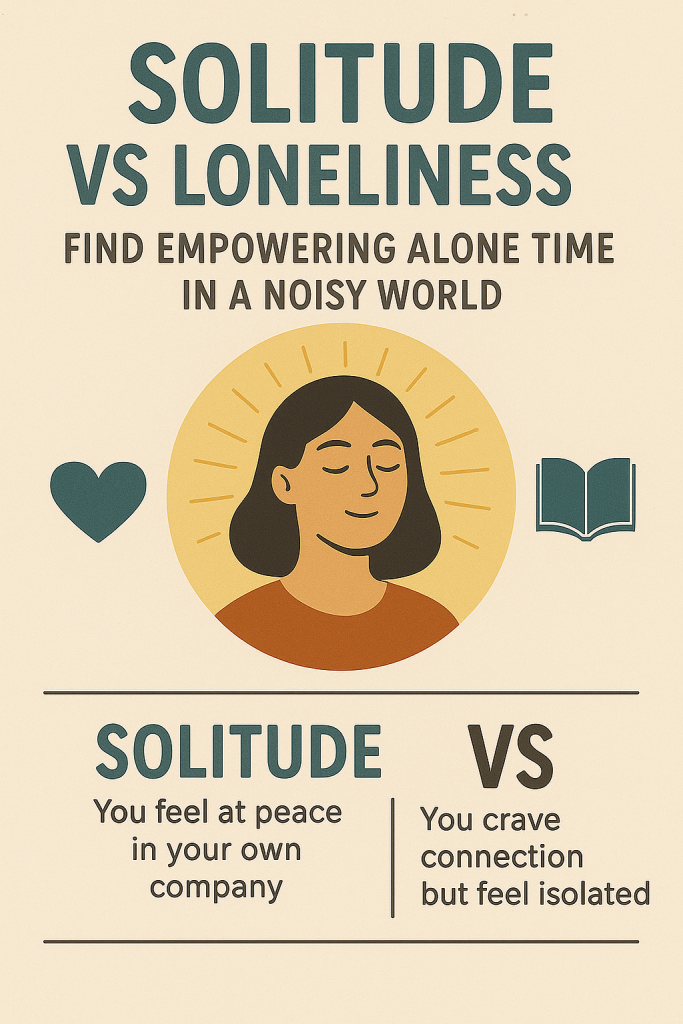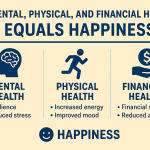Introduction: Alone in a Crowded World
We live in the noisiest era of human history. Social media, group chats, constant notifications—our lives are flooded with voices, opinions, and comparisons. Ironically, despite being more connected than ever, people are reporting record levels of loneliness. According to a 2023 Gallup survey, nearly one in four adults worldwide feels lonely on a regular basis.
But here’s the paradox: while loneliness can be painful and draining, solitude can be deeply nourishing. The key is understanding the difference.
- Loneliness is the ache of unwanted isolation.
- Solitude is the empowerment of chosen aloneness.
In this article, we’ll explore solitude vs loneliness, why the distinction matters, and how you can transform alone time into a source of clarity, creativity, and peace.
Solitude vs Loneliness: Two Very Different Experiences
Though the words are often used interchangeably, they couldn’t be more different.
What Is Loneliness?
Loneliness is the painful absence of connection. It’s a feeling of being cut off from others, even when surrounded by people. Psychologists define it as a mismatch between the social relationships you want and the ones you have.
Common signs of loneliness include:
- Feeling unseen or unheard
- Emotional emptiness
- A sense of being “out of sync” with the world
- Anxiety or sadness in social settings
Research links chronic loneliness to depression, anxiety, weakened immunity, and even higher mortality rates. The U.S. Surgeon General recently described loneliness as an “epidemic” with health impacts comparable to smoking 15 cigarettes a day.
What Is Solitude?
Solitude, by contrast, is the joyful presence of self. It’s a conscious decision to step away from the crowd in order to rest, reflect, or recharge. Far from being isolating, solitude is often the foundation of growth.
Signs of healthy solitude include:
- Feeling at peace in your own company
- Increased creativity and focus
- Emotional clarity
- A sense of alignment with your values
Key difference: Loneliness drains your energy. Solitude restores it.
Why Solitude Is Essential for a Balanced Life
We often treat solitude as optional, even suspicious—“Why would you want to be alone?” But history, psychology, and even biology show us solitude is essential.
1. Solitude Enhances Mental Clarity
Noise crowds our minds. Constant conversations, notifications, and opinions make it hard to hear our own thoughts. Solitude is like closing extra browser tabs—it restores focus.
A study published in the Journal of Personality found that people who embrace solitude report greater self-reflection and clarity in decision-making.
2. Solitude Boosts Creativity
Many of history’s greatest breakthroughs were born in solitude. Virginia Woolf, Henry David Thoreau, and Steve Wozniak all credited alone time with sparking creativity. Without solitude, we risk drowning in imitation instead of innovation.
3. Solitude Regulates Emotions
Solitude gives us space to process emotions instead of reacting impulsively. Neuroscientists suggest that quiet reflection strengthens the brain’s prefrontal cortex, the area responsible for self-control and emotional regulation.
4. Solitude Strengthens Relationships
It might sound counterintuitive, but being alone makes us better partners, friends, and colleagues. Why? Because solitude helps us recharge emotionally, so we show up with more patience, presence, and authenticity in our relationships.
5. Solitude Helps You Discover Your True Self
Without external noise, you uncover your genuine interests, values, and goals. In solitude, you’re not performing—you’re simply being.
The Hidden Dangers of Loneliness
While solitude nourishes, loneliness harms. Loneliness doesn’t just affect mood; it affects physical health.
Studies show that chronic loneliness is linked to:
- Weaker immune response (making us more vulnerable to illness)
- Increased stress hormones like cortisol
- Poorer cardiovascular health
- Shorter lifespan
Dr. Vivek Murthy, U.S. Surgeon General, warns: “Loneliness is more than just a bad feeling. It harms both individual and societal health.”
This is why it’s critical to transform loneliness into solitude.
How to Turn Loneliness Into Empowering Solitude
So how do you make that shift? Here are practical strategies:
1. Reframe the Story
Instead of saying, “I’m alone because nobody’s here,” say, “I’m alone because I get this time to be with myself.” The language we use shapes how we feel.
2. Set an Intention for Alone Time
Loneliness feels empty because it lacks purpose. Solitude feels rich because it has intention. Use alone time for journaling, meditating, reading, or practicing a hobby.
3. Disconnect to Reconnect
If you spend your “alone time” scrolling social media, you’re still immersed in others’ noise. Try screen-free solitude—even 30 minutes a day—to truly connect with yourself.
4. Create Solitude Rituals
Small daily rituals make solitude a normal, nourishing part of life. Examples:
- Morning coffee without distractions
- Evening journaling
- A weekly solo walk or “thinking time”
5. Start Small
If solitude feels uncomfortable, begin with short sessions—5–10 minutes of quiet breathing, then gradually extend. Over time, your tolerance (and enjoyment) of silence will grow.
Practical Exercises to Deepen Solitude
Here are actionable practices to shift from loneliness to solitude:
✦ Journaling for Clarity
- Write down three emotions you feel right now.
- Ask yourself: “What do these feelings need from me?”
- Spend 5 minutes free-writing without editing.
✦ Nature Immersion
Take a 20-minute walk without headphones. Notice birds, leaves, the air. Research shows “awe walks” improve mood and reduce rumination.
✦ The Solo Date
Treat yourself to dinner, a movie, or a museum visit—alone. Notice how it feels to enjoy your own company.
✦ Meditation or Breathwork
Even 10 minutes of mindfulness can help you reconnect inwardly. Apps like Headspace or Calm can guide beginners.
✦ Creative Solitude
Engage in a hobby—painting, music, cooking—not for productivity, but for play. This shifts alone time from emptiness to expression.
Balancing Solitude and Social Life
Of course, solitude doesn’t replace connection. Humans are wired for relationships. The key is balance:
- Too much solitude = risk of isolation.
- Too much socializing = risk of burnout and self-loss.
Healthy living means moving between solitude and connection like tides—both are necessary for emotional balance.
A simple rule of thumb: If solitude feels nourishing, you’re in balance. If it feels draining, seek connection.
Common Questions About Solitude
1. Is solitude healthy?
Yes—when chosen, solitude reduces stress, boosts creativity, and deepens self-awareness.
2. How much alone time is too much?
It depends on your personality. Introverts may need more solitude, extroverts less. The key is whether solitude feels empowering or isolating.
3. Can solitude cure loneliness?
Not entirely, but it can help. Solitude teaches you to enjoy your own company, making social connections healthier rather than desperate.
4. What if solitude makes me anxious?
Start small—try short periods of quiet and build up. Journaling or guided meditations can make the transition easier.
Quotes on Solitude to Inspire You
- “Loneliness expresses the pain of being alone, and solitude expresses the glory of being alone.” — Paul Tillich
- “Without great solitude, no serious work is possible.” — Pablo Picasso
- “I live in that solitude which is painful in youth, but delicious in the years of maturity.” — Albert Einstein
Conclusion: Choosing Solitude in a Noisy World
Alone time doesn’t have to equal loneliness. When embraced intentionally, solitude is one of life’s greatest gifts—a place where clarity emerges, creativity blossoms, and peace is restored.
Instead of fearing silence, lean into it. Instead of dreading empty rooms, fill them with your own presence.
In solitude, you don’t lose connection—you rediscover the most important one: the connection with yourself.



